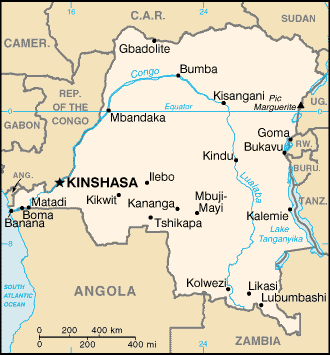Congolese ravaged by war and disease
I wish that I could see this in action, the registering of Congolese for elections and the attempt to disseminate information about the constitution and the voting process, which is possible in stable urban locations, but must also take place in the unreachable jungle, where villages have become islands and citizens have become Internally Displaced Persons (IDPs). I wish I were in touch with the person I knew who was working for the Independent Electoral Commission so I had a better idea of how this process, which is getting some international press, is linked to the ongoing themes of conflict and lack of access to education and health care.
What has happened in Maniema Province, Ituri and the Kivus in the eastern part of DR Congo is now happening in Katanga, a province that is known for its mineral resources and which has tried to secede from the country in the past. As stated below, in Katanga, part of the violence transpired at a camp for IDPs. Imagine having fled from your home and been put in a camp, grouped with a crowd of people that maybe you know and maybe you don't, having no idea when you might return home or when the resources that support your current unsustainable lifestyle might run out. And then imagine being attacked and having to flee again. Can you imagine? I cannot.
And when you are forced to flee, you have malaria and are feverish and dizzy and weak, or you have cholera and thus are dehydrated and can't control your bowels, and you know that if you just had access to a health center and some meager funds to pay the fees that the doctor would prescribe something and you'd be cured, but you don't have the money so you suffer. You have stomach cramps because of malnutrition and your clothes are threadbare and dirty. Can you imagine? [I've had malaria, in a US hospital, and I thought that was bad.]
I suppose some of those 10 million eligible voters who did not cast a ballot might have been busy with malaria or cholera or fleeing conflict or fleeing the camp where they had sought refuge, so maybe they didn't have a chance to read through the constitution or go to the polls.
The following is taken from Medecins Sans Frontiers' Top ten under-reported humanitarian stories of 2005

© Petterik Wiggers/HH
A man suffering from malaria at a camp form internally displaced in Lukona. The level of health care in Congo is very low, while the demand is high and many families flee from their compounds after clashes between army troops and Mai Mai.
"The extreme deprivation and violence endured by millions of Congolese goes virtually unnoticed to the rest of the world.
"Since mid-November, renewed fighting between the Congolese Army (FARDC) and the Mai-Mai rebels has caused the displacement of tens of thousands of people throughout Katanga province, in southeast Democratic Republic of Congo (DRC). In one instance in early December, armed men attacked a camp for displaced people in Katanga, forcing some 3,000 people to once again flee for their lives.
"More than a decade of war and devastation has collapsed an already weak public health system and caused widespread misery for people throughout the country. During the past year, the northeastern regions of Ituri, North Kivu, and South Kivu were again the epicenter of violence, with multiple factions fighting for the control of the area's resources, preying on civilians, and committing appalling sexual violence against women.
"Between January and May, MSF assisted many of the 80,000 civilians who had fled their homes in Ituri because of fear and insecurity. Emergency relief programs in the DRC represent MSF's largest mobilization of aid in the world today, and recent MSF surveys found staggeringly high child mortality rates in several regions - more than six times the emergency threshold in the violence-plagued town of Lubutu and more than five times in the relatively stable town of Inongo.
"The surveys also revealed that few people have access to health facilities let alone treatment, even in areas not ravaged by violence, in part because they cannot afford the fees, leading to an even greater human toll taken by easily treated diseases like malaria and cholera. While the war officially ended in 2003, peacekeeping and political efforts have not translated into better living conditions for most Congolese and the situation remains dire in many parts of the country."
Also covered in the report: Chechnya | Haiti | R&D For HIV/AIDS | Northeastern India | Southern Sudan | Somalia | Colombia | Northern Uganda | Ivory Coast


0 Comments:
Post a Comment
<< Home